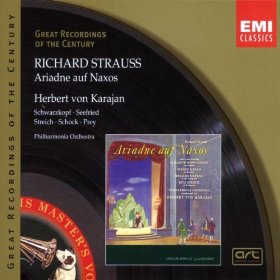R. Strauss Ariadne auf Naxos
View record and artist detailsRecord and Artist Details
Composer or Director: Richard Strauss
Genre:
Opera
Label: Great Recordings of the Century
Magazine Review Date: 11/1999
Media Format: CD or Download
Media Runtime: 128
Mastering:
Mono
ADD
Catalogue Number: 567077-2

Tracks:
| Composition | Artist Credit |
|---|---|
| Ariadne auf Naxos |
Richard Strauss, Composer
Alfred Neugebauer, Major-Domo, Speaker Anny Felbermayer, Echo, Soprano Elisabeth Schwarzkopf, Ariadne, Soprano Fritz Ollendorff, Truffaldino, Bass Gerhard Unger, Scaramuccio, Tenor Grace Hoffman, Dryad, Contralto (Female alto) Helmut Krebs, Brighella, Tenor Herbert von Karajan, Conductor Hermann Prey, Harlequin, Baritone Hugues Cuénod, Dancing Master, Tenor Irmgard Seefried, Composer, Mezzo soprano Karl Dönch, Music-Master, Baritone Lisa Otto, Naiad, Soprano Philharmonia Orchestra Richard Strauss, Composer Rita Streich, Zerbinetta, Soprano Rudolf Schock, Bacchus, Tenor |
Author: Alan Blyth
Listening once again to this famous set I was struck anew at Walter Legge’s genius in being able to assemble a near-ideal cast for an operatic project. Here he gathers singers hand-picked for their roles, including the 26-year-old Hermann Prey, almost unknown at the time, as a mellifluous Harlequin, along with such veterans as Karl Donch from Vienna as an appropriately fussy Music Master and Hugues Cuenod as a fleet Dancing Master. These, plus the leading singers, were obviously rehearsed to a nicety by Legge and Karajan so that not a detail, verbal or musical, is left unobserved. In that sense so many of these Great Recordings under Karajan are unrepeatable events in recording history.
Seefried (see also ‘Reputations’, page 44) is a wonderfully eager, impulsive Composer, who brings all her experience to bear on the part, stretching back ten years to the legendary performance under Bohm to celebrate Strauss’s 80th birthday in Vienna in 1944. Almost as exemplary is Streich as Zerbinetta. Few sopranos have encompassed all the notes while at the same time preserving such fresh, even tone. She misses only the touch of the flirtatious that Geszty (Kempe), as I also recall from her assumption on stage, brought to the taxing part. Schock is a tenor of the old German school, redolent of Tauber, tonally a shade tight but properly exuberant and ardent, with all the notes in the high tessitura easily encompassed.
Schwarzkopf gives a wondrous performance, technically speaking. Her interpretation is at first self-conscious, every detail underlined, but in the final scene she forgets self and admirably conveys Ariadne’s conflict of emotions. Janowitz does as well for Kempe and adds a fuller voice perhaps more apt for Ariadne. Reining, so vulnerable and warm for Bohm in 1944, is still better.
Nothing escapes Karajan’s eagle eye and wise ear, but in seeking perfection, something of urgency and sheer drive goes missing. It is there with Kempe, whose urgent beat and glorious Dresden Staatskapelle, heard in stereo, are hard to equal. The Karajan mono leaves the orchestra sounding a shade starved of body. Confirmed Straussians will want both sets, but with the Kempe also at mid-price, it remains – just – my first choice. The Bohm version is a historic document to be cherished.'
Seefried (see also ‘Reputations’, page 44) is a wonderfully eager, impulsive Composer, who brings all her experience to bear on the part, stretching back ten years to the legendary performance under Bohm to celebrate Strauss’s 80th birthday in Vienna in 1944. Almost as exemplary is Streich as Zerbinetta. Few sopranos have encompassed all the notes while at the same time preserving such fresh, even tone. She misses only the touch of the flirtatious that Geszty (Kempe), as I also recall from her assumption on stage, brought to the taxing part. Schock is a tenor of the old German school, redolent of Tauber, tonally a shade tight but properly exuberant and ardent, with all the notes in the high tessitura easily encompassed.
Schwarzkopf gives a wondrous performance, technically speaking. Her interpretation is at first self-conscious, every detail underlined, but in the final scene she forgets self and admirably conveys Ariadne’s conflict of emotions. Janowitz does as well for Kempe and adds a fuller voice perhaps more apt for Ariadne. Reining, so vulnerable and warm for Bohm in 1944, is still better.
Nothing escapes Karajan’s eagle eye and wise ear, but in seeking perfection, something of urgency and sheer drive goes missing. It is there with Kempe, whose urgent beat and glorious Dresden Staatskapelle, heard in stereo, are hard to equal. The Karajan mono leaves the orchestra sounding a shade starved of body. Confirmed Straussians will want both sets, but with the Kempe also at mid-price, it remains – just – my first choice. The Bohm version is a historic document to be cherished.'
Discover the world's largest classical music catalogue with Presto Music.

Gramophone Digital Club
- Digital Edition
- Digital Archive
- Reviews Database
- Full website access
From £8.75 / month
Subscribe
Gramophone Full Club
- Print Edition
- Digital Edition
- Digital Archive
- Reviews Database
- Full website access
From £11.00 / month
Subscribe
If you are a library, university or other organisation that would be interested in an institutional subscription to Gramophone please click here for further information.




